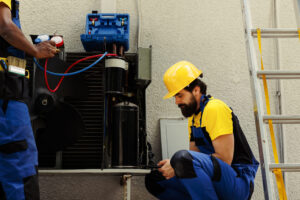Let’s imagine, for a moment that you are an up-and-coming chef with your own YouTube following, and you’ve decided that you’re going to start a cooking show. As a homeowner, you already have the “studio” that you would need, and the tools of the trade are already at hand. As well as your own YouTube audience, you’re looking to expand your following with your cooking show format, and decide to explore more niche recipes. Through trying out things that no other YouTube channel or even competitive shows have attempted, your status as a celebrity chef grows until one day, you receive a call offering you your own Food Network show. The first time on a professional set proves to be the beginning of a long and industrious career, with comparisons of your celeb-chef status reaching greats like Gordon Ramsay, Nigella Lawson, or The Pioneer Woman.
Now think about your own home. With the appliances that you have in your kitchen, or even in the house as a whole, how likely are you to be the next big celebrity chef? Is your kitchen studio made up of new units upon a new unit, or do you have a much older system in place? How much of a lifespan do you reckon that your refrigerators and cookers have? Sure, they were an efficient model when they were first installed ages ago, but now…. maybe not. Checking the age of your appliances is a great way to know the life expectancy of everything from your AC system to your dishwasher.
Old Appliances
The point is this—yes, dropping everything to become a celebrity chef is an analogy that may seem far-fetched, but when it comes to your home’s appliances, it isn’t really a bad way to consider the longevity of your set-up! Who knows, you may even make your own cooking show someday (and good luck to you if you do!) but right now, if your cooking tools are predominantly made up of appliances that have eclipsed their life expectancy, then the only thing that you are likely to make is a mess.
The same metaphor applies to the rest of the home too, particularly for your HVAC system. The HVAC (which stands for heating, ventilation, and air conditioner) units are the most used in any household and require regular maintenance to keep in operation, even if they are also older systems. Obviously, analog thermostats and a rusty furnace may make determining the age of your appliances a little simpler, but the same cannot be said of the air conditioner units, particularly if part of them is outside of the building.
The HVAC Relationship
The HVAC system is used all year round in some capacity: the furnace is often working over the winter months to warm a cool home, whereas the air conditioner unit does most of its work keeping you cool in the summer. If there is a fault with either of these, or the ventilation within the home is blocked, then further problems arise. If the AC unit isn’t keeping the air dry, then the furnace has to work harder to warm the air and the moisture within. If the furnace has a problem then the air conditioner, (particularly if it is an older air conditioner unit which doesn’t have the heat pump installed) is going to be circulating cool air only, which also fails to dry out the air. Either way, an increase in moisture is terrible for your home’s health, your physical health, and the health of your energy savings, which you may as well forget about as an old appliance costs more in both energy and money to run.
So, as you can see, it’s a good idea to keep on top of your appliances. You can never be specific about how old an appliance is, particularly if it was already in the home when you moved in. You can ask the previous tenants or the landlord, but if you are a homeowner then this may not be very practical. You can be a little more general, however, when it comes to determining their age. Most air conditioners last for about 10 to 15 years with decent upkeep, and potentially longer if they are very well maintained, but modern air conditioners have extra features (like the afore-mentioned heat pump) that take the pressure off other HVAC systems.
Out With The Old
If you have realized that the energy bills are increasing, the indoor air is humid, or is too chilly, or have started to smell damp and see mold on the walls, then it’s a good indication that the relationship between HVAC appliances has broken down. If you are going to replace any of them, start with the air conditioner. The versatility of newer models means that an air conditioner unit can be used to keep the air cool and dry in summer, and warm and dry in winter with the addition of a heat pump. It means that other appliances aren’t being stretched to overuse, and less energy is used overall. Just remember to keep on maintaining them new AC units, and keep them clean and shiny for your cooking show debut!








